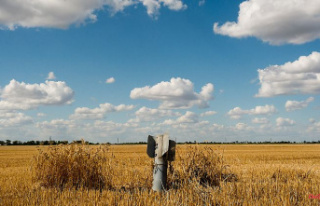For a long time, little was heard from climate activists, now they are back. They stick, paste and scrawl, they burden the judiciary and block ambulances. Why are we accepting this?
Since reality has turned into an overloaded thriller in which pandemics and the danger of world war grotesquely overlap, it has been difficult to set new dramaturgical peaks. The climate activists have also recognized this: they make a ruckus and a fuss, they disregard art, the law and beetroot. How do you deal with something like that?
Whoever bangs tomato soup on a Van Gogh painting, messes up a ministry with red vegetables, or is glued to the gold patinated frame of the Sistine Madonna has a sense of drama, that's for sure. Typical Generation Z, one might say, always vainly pushing into the frame of attention.
But it's not as harmless as representatives of the activists like to portray it. In the case of the Madonna, the glue caused damage to the frame, and museum visitors are prevented from enjoying the art - both acutely and in the long term, as security measures are now naturally being tightened.
The protest may also harm "the cause" - because the stunts, which often seem quite vain, don't make climate activists any more sympathetic. But protest is there to disturb. The desperation is real in the sense that activists believe in it. More than the actions themselves, however, the reactions at both ends of the political spectrum are astounding. The greens in particular are remarkably quiet.
The comments from the Union again sound as if they had once again confused the 1950s with the year 2022. There is talk of spoiled children and a lack of education. It sounds familiar, similarly in James Dean's time people talked about "hooligans", i.e. "hooligans", that bored, wealth-spoiled first global youth culture that discharged its energy in alcohol, consumption and rock'n'roll.
It's a bizarre and wrong association. Among the activists are not only young people. And unlike the hooligans, the activists have a political concern (survival) and even a very strong sense of responsibility for their own future and that of their children.
Then there are the climate protest understanders: Their perhaps most primitive argument is the participation of some scientists in the actions, such as the "Scientist Rebellion". This glorification of science has spoiled many a pandemic debate. It is the idea that politics is nothing more than an abacus with which the only right solution can be calculated.
But those scientists who push the government change roles - and are activists like everyone else. Anyone who occupies a tree, for example, can even be a criminal, professor title or not. But once there is a will to play things down, the legal system obviously has to step aside. Although the activists commit crimes - such as damage to property, coercion or violations of the assembly law - it should somehow be okay for the good cause. About 700 procedures are running against the blockers.
The legal situation is clearer than many people suspect: climate protection does not legitimize coercion, and global warming is not a "state of emergency" in the legal sense, as the activists believe. The criminal offenses of property damage and coercion are not melting away with the polar ice caps. But the activists are pursuing a radical idea: every now must bow before tomorrow.
Again and again, ambulances arrive late at their destination because protesters get stuck on the street. Does the heart attack of a fifty-year-old in October 2022 matter because climate change threatens the existence of humanity in the medium term? What about the children's birthday party that the mother doesn't get to on time because she's stuck in traffic?
The activists' frustration is understandable. The traffic light is currently extending coal and nuclear power, and because of the nuclear conflict in the governing parties, the Chancellor has even given up his greatest trump card: In the dispute over the continued operation of the nuclear power plants, he insisted in a letter on his "guideline competence". It is a power-word fairy tale to win over the fringes of the Greens and the Liberals for the government course.
She should know that the traffic light merely postponed the conflict. In the spring the energy crisis is not over, at worst the winter has enriched it with memories of cold, dark apartments. Despite existential fears, medium-sized companies and industry representatives have not yet got stuck somewhere. They probably need their hands free to work.
In April 2023 we will have to talk about nuclear power, coal and fracking again, look for solutions and explore compromises. In the meantime, however, the Greens could also bring themselves to tell the radical parts of their base that politics cannot be blackmailed.












